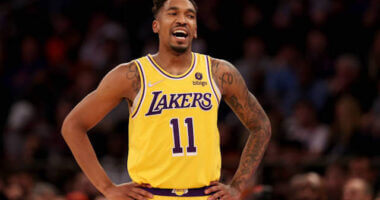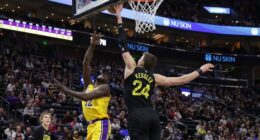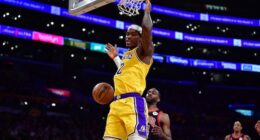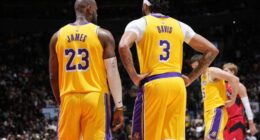During Kobe Bryant’s exit interview, he answered the media’s questions in typical Kobe fashion; the cold-hard truth sprinkled with glimpse of humour here and there.
One answer of he provided stuck out like a sore thumb though.
He referred to the past season as a wasted year of his life.
There are a myriad of reasons why I admire Kobe, and his insatiable thirst to win is pretty high on the list.
But a wasted year Kobe? I disagree.
If the 2010-2011 season was a wasted year of Kobe’s life, then what would he call the time period from the beginning of the 2005 campaign right up until Kupchak traded for Gasol in 2008?
In that four year window the Lakers failed to accomplish much of anything in the post season.
Sorry to say it Kobe, but if 2011 wasted year then I’d call 2005-2008 a waste of your prime.
When the Lakers were at their worst record-wise, Kobe was at his best individually.
Let’s refresh your memory. In the aforementioned seasons Kobe was at the prime of his athletic career. No. 24 harnessed No. 8’s athleticism and combined it with his alpha dog mentality to create the deadliest scorer in the league at the time. He was able to get to the rim any time he wanted, as well as pulling up to make a deep three or a fall away jumper.
Kobe just began calling himself the Black Mamba because he was inspired by the snake’s penchant of attacking without being provoked.
The 2005-6 season was the best showcase of Kobe’s killer instinct, reminiscent of his favourite animal.
Without Shaq by his side, Kobe was “doin’ work” night in and night out.
He logged 41 minutes on average and became the fifth player in NBA history to average 35 points a game or more.
This was the year when Kobe outscored the Mavericks by himself, 62-61, through three quarters.
This was the year when Kobe helped the Lakers overcome an 18 point deficit at the hands of the Raptors, by pouring in 81 points.
This was the year when Kobe registered 40 or more points in 27 games, that’s a quarter of the season.
In short, he was unstoppable. But there was just one problem, despite his legendary scoring outputs, Bryant was going to war with no weapons.
If we are to believe that Kobe only plays for championships then the Lakers’ management “wasted” Kobe at his apex.
Before each game, Kobe would look around the locker room knowing the other four starters were Smush Parker, Lamar Odom, Kwame Brown and Chris Mihm.
And his bench wasn’t much better. After Devean George, Sasha Vujacic, an undeveloped Bynum when he was healthy and a pre-injury Luke Walton, the other members of the bench were dead weight.
Who remembers Brian Cook, the Lakers first round pick in 2003?
How about Devin Green, a dude’s whose season highlight is giving Kobe pats on the back after Coach Jackson pulled him out of the game.
Despite his supporting cast, or lack thereof, Kobe managed to get the Lakers within one game of upsetting the Steve Nash led Suns in the first round of the playoffs.
Sure, the theatrics in game four were great; but that series was bookended by the 31 point spanking that sent the Lakers packing.
That series encapsulated the season(s) of Laker basketball: Kobe was able to take them to the cusp of victory before the Suns realized this team has no offensive weapons beside Kobe and Lamar Odom.
The following year, the Lakers were eliminated again by the run n’ gun Suns, this time in five games; and Kobe came to an epiphany.
Kobe learned four things after three years of playing on his own.
- It’s a lot more difficult to close out games when teams know you’re option A, B, C and D.
- Lamar Odom will never be his Scottie Pippen.
- He required teammates and needed to be a better one.
- In order to contend for championships again, a skilled big man to replace Shaq was essential.
After months of demanding out of Los Angeles, Kobe’s wish was granted indirectly with the arrival of Pau Gasol.
Gasol is the perfect complement to Kobe.
Like Kobe, Pau couldn’t win on his own. And unlike Shaq, Pau was more than willing to take a backseat to Kobe. And the rest as they say is history.
It’s debateable that Kobe would’ve never scored 81 if he had the supporting cast he did now; but he would have extended his prime ever further if he didn’t have to carry a team littered with journeymen and role players.
Next: Kobe’s Early Exit in 2010-11






